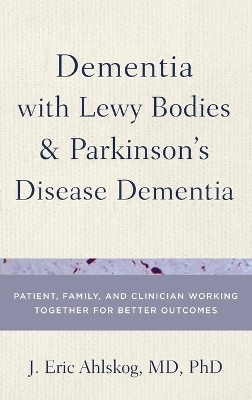
Dementia with Lewy Body and Parkinson's Disease Patients
Oxford University Press Inc (Verlag)
978-0-19-997756-7 (ISBN)
Dementia implies impaired thinking and memory. It develops in the majority of people with Parkinson's disease if they live long enough. A closely related condition is Dementia with Lewy Bodies, which is the second leading cause of dementia (behind Alzheimer' disease). These are all too common disorders, yet little is written for the lay public about such dementia. This book is designed to fill that void, and especially to provide guidelines for treatment. A cure does not yet exist, but optimal medical treatment can markedly improve quality of life, for both patients and family.
Treating these conditions can become complicated, given the variety of available drugs, plus the unintended side effects of some medications. Busy clinicians are increasingly challenged by time constraints, which is another complicating factor. Hence, patients, family, caregivers need to be armed with facts, which will help their clinicians choose the best drugs and avoid those most likely to cause other problems. Drugs, doses, medications to avoid and why, are all discussed in detail. This book is designed to provide the patient-family team with the knowledge necessary to partner with their doctors to get the best medical treatment.
Dr. Ahlskog is an expert in Parkinson's disease and Dementia with Lewy Bodies, thanks to his clinical and research work at Mayo Clinic. His previous general-audience title, "The Parkinson's Disease Treatment Book" has sold over 11,000 copies.
Dr. Ahlskog is Professor of Neurology, Mayo Medical School and Chair of the Mayo Clinic Section of Movement Disorders, Rochester, Minnesota. He is a full-time clinician with most of his Mayo practice devoted to Lewy body disorders, including Parkinson's disease and Dementia with Lewy Bodies. He has published over 200 manuscripts in peer-reviewed medical and scientific journals and authored two books.
Preface ; Glossary ; Chapter 1. Background ; Chapter 2. What is known about the cause ; Chapter 3. Are there medications for slowing the progression? ; Chapter 4. Defining the problems that require individualized treatment ; Treatment Chapters ; Levodopa-responsive problems ; . ; Chapter 5. Which drug for Parkinsonism? Walking, stiffness, tremor, slowness ; Chapter 6. Using carbidopa/levodopa to treat parkinsonism ; Chapter 7. Parkinsonism treatment among those already on medications ; Chapter 8. Unstable responses and dyskinesias: later motor problems ; Chapter 9. Other levodopa-responsive problems: anxiety, pain, insomnia ; Problems exacerbated by Parkinson medications ; Chapter 10. Hallucinations, delusions ; Chapter 11. Pathological behaviors provoked by dopamine agonist drugs: gambling, sex, eating, spending ; Cognitive problems ; Chapter 12. Confusion, impaired thinking, judgment ; Dysautonomia: blood pressure, bladder, bowels ; Chapter 13. Blood pressure and orthostatic hypotension: faints, near-faints and lightheadedness ; Chapter 14. Bladder problems ; Chapter 15. Bowels and constipation ; Other sleep problems ; Chapter 16. Daytime drowsiness ; Chapter 17. Acting out dreams: REM sleep behavior disorder ; More general issues ; Chapter 18. Depression ; Chapter 19. General medical issues ; Chapter 20. Importance of regular exercise ; Chapter 21. Hospitalization and nursing facilities: Keeping everyone on the same page ; Chapter 22. Families, caregivers, assistance
| Verlagsort | New York |
|---|---|
| Sprache | englisch |
| Maße | 157 x 236 mm |
| Gewicht | 544 g |
| Themenwelt | Sachbuch/Ratgeber ► Gesundheit / Leben / Psychologie ► Krankheiten / Heilverfahren |
| Medizin / Pharmazie ► Allgemeines / Lexika | |
| Medizin / Pharmazie ► Medizinische Fachgebiete ► Neurologie | |
| Medizin / Pharmazie ► Medizinische Fachgebiete ► Palliativmedizin | |
| ISBN-10 | 0-19-997756-9 / 0199977569 |
| ISBN-13 | 978-0-19-997756-7 / 9780199977567 |
| Zustand | Neuware |
| Haben Sie eine Frage zum Produkt? |
aus dem Bereich


